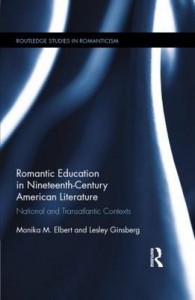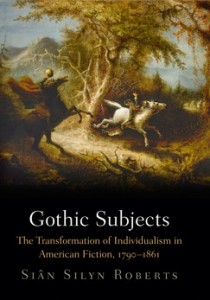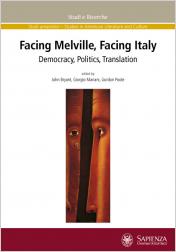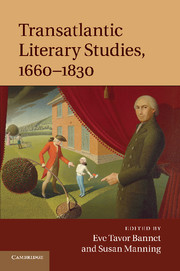From the press: “Focusing on the importance of Martineau’s contribution to the development of the early Victorian press, this book highlights the degree to which the public quarrel between her and Dickens in the mid-1850s represented larger fissures within nineteenth-century liberalism. It places Martineau and Dickens within the context of Anglo-American liberalism and demonstrates how these fissures were embedded within a transatlantic conversation over the role of the press in forming a public sphere essential to the development of a liberal society.”
The Political Poetess: Victorian Femininity, Race, and the Legacy of Separate Spheres by Tricia Lootens
Hardcover | Published: 2016 | 344 Pages | $45.00 | £37.95 | 6 X 9.25 inches | ISBN: 9780691170312
For those whose interests center on transatlantic nineteenth-century poetry, Tricia Lootens’s The Political Poetess: Victorian Femininity, Race, and the Legacy of Separate Spheres (Princeton UP, 2016) is now essential reading, along with Meredith McGill’s The Traffic in Poems (2008) and Daniel Hack’s Reaping Something New (also 2016). Her innovative book in fact has relevance for all those who are interested in transatlantic study and research methods.
Rather than viewing the poetess as being in retreat to an apolitical, patriotic private sphere of mourning and praise, Lootens demonstrates that the very premise of a decorous female separate sphere depends on profits resulting from racist violence (viz., slavery and imperial expansion) and is thus inherently riven, haunted, political. Drawing upon Hegel’s theory of the internal enemy of the state (derived from a reading of Antigone), she also theorizes what she calls “suspended spheres,” “modeling,” according to the author, “a national sentimental ‘private sphere,’ conceived as a violently constructed, uneasily maintained sacred space at the heart of the State. As a realm of mortal subjection, mourning, and failed resistance, this sphere demands femininity’s protection; as a repository for eternal, individual love, it opens out onto eternity, investing feminine demands for the bodies of slain soldiers with a divine authority that supersedes statecraft” (personal communication).
Tricia Lootens also reveals the political poetess in historicist terms, by reading the pervasiveness of what she calls “Abolition time” (still ongoing because not yet fully resolved or remedied), given the deep involvement of multiracial British and American women in abolition after the 1833 British Abolition act. Combined with her revised “sphere” theory, Lootens thus reframes affective lyrics by women poets as always intrinsically political. As her own refrain goes, “Who made the Poetess white? No one, not ever.” In a volume that offers as much to classroom teachers as to scholars, she opens up the poetess figure not only to transatlantic and transnational criss-crossing but also to connections with pressing issues today.
Individual chapters emphasize, among other poets, Felicia Hemans (in the contexts of race, slavery [“Bride of the Greek Isle”]), war [“Casabianca”]); Elizabeth Barrett Browning (in a bravura chapter on her “Curse for a Nation”); and—though reference to Harper threads throughout the book—Frances Harper (whose Aunt Chloe poems Lootens reads against Hemans’s “Switzer’s Wife” and whose oratory Lootens approaches as African American Poetess performance). In every discussion throughout The Political Poetess, whether broad or highly specific, Tricia Lootens props open her own scholarly “sphere” to transatlantic literature and fundamental issues of social justice. I enthusiastically recommend her book to all visitors to this site.
–Linda K. Hughes
The ‘Conspiracy’ of Free Trade: The Anglo-American Struggle over Empire and Economic Globalisation, 1846-1896
Following the Second World War, the United States would become the leading ‘neoliberal’ proponent of international trade liberalization. Yet for nearly a century before, American foreign trade policy was dominated by extreme economic nationalism. What brought about this pronounced ideological, political, and economic about face? How did it affect Anglo-American imperialism? What were the repercussions for the global capitalist order? In answering these questions, The ‘Conspiracy’ of Free Trade offers the first detailed account of the controversial Anglo-American struggle over empire and economic globalization in the mid- to late-nineteenth century. The book reinterprets Anglo-American imperialism through the global interplay between Victorian free-trade cosmopolitanism and economic nationalism, uncovering how imperial expansion and economic integration were mired in political and ideological conflict. Beginning in the 1840s, this conspiratorial struggle over political economy would rip apart the Republican Party, reshape the Democratic Party, and redirect Anglo-American imperial expansion for decades to come.
Dead Reckoning: Transatlantic Passages on Europe and America
Dead reckoning is the nautical term for calculating a ship’s position using the distance and direction traveled rather than instruments or astronomical observation. For those still recovering from the atrocities of the twentieth century, however, the term has an even grimmer meaning: toting up the butcher’s bill of war and genocide.
As its title suggests, Dead Reckoning is an attempt to find our bearings in a civilization lost at sea. Conducted in the shadow of the centennial of the First World War, this dialogue between Romanian American poet Andrei Guruianu and Italian American essayist Anthony Di Renzo asks whether Western culture will successfully navigate the difficult waters of the new millennium or shipwreck itself on the mistakes of the past two centuries. Using historical and contemporary examples, they explore such topics as the limitations of memory, the transience of existence, the futility of history, and the difficulties of making art and meaning in the twenty-first century.
Andrei Guruianu teaches in the Expository Writing Program at New York University. His previous books include the poetry collections Made in the Image of Stones and Portrait without a Mouth.
Anthony Di Renzo is Associate Professor of Writing at Ithaca College and the author of many books, including Bitter Greens: Essays on Food, Politics, and Ethnicity from the Imperial Kitchen, also published by SUNY Press.
Little Miss Grouch: A Narrative Based Upon the Private Log of Alexander Forsyth Smith’s Maiden Transatlantic Voyage, pp. 1-206
Leopold is delighted to publish this classic book as part of our extensive Classic Library collection. Many of the books in our collection have been out of print for decades, and therefore have not been accessible to the general public. The aim of our publishing program is to facilitate rapid access to this vast reservoir of literature, and our view is that this is a significant literary work, which deserves to be brought back into print after many decades. The contents of the vast majority of titles in the Classic Library have been scanned from the original works. To ensure a high quality product, each title has been meticulously hand curated by our staff. This means that we have checked every single page in every title, making it highly unlikely that any material imperfections – such as poor picture quality, blurred or missing text – remain. When our staff observed such imperfections in the original work, these have either been repaired, or the title has been excluded from the Leopold Classic Library catalogue. As part of our on-going commitment to delivering value to the reader, within the book we have also provided you with a link to a website, where you may download a digital version of this work for free. Our philosophy has been guided by a desire to provide the reader with a book that is as close as possible to ownership of the original work. We hope that you will enjoy this wonderful classic work, and that for you it becomes an enriching experience. If you would like to learn more about the Leopold Classic Library collection please visit our website at www.leopoldclassiclibrary.com
http://www.amazon.com/Little-Miss-Grouch-Narrative-Transatlantic/dp/B01BGZBZ7O/ref=sr_1_2?s=books&ie=UTF8&qid=1454989522&sr=1-2&keywords=transatlantic&refinements=p_n_publication_date%3A1250226011
New Book: Writing for Justice: Victor Séjour, the Kidnapping of Edgardo Mortara, and the Age of Transatlantic Emancipations
Transatlantic Emancipations (Re-Mapping the Transnational: A Dartmouth Series in American Studies) Paperback – November 3, 2015
In Writing for Justice, Elèna Mortara presents a richly layered study of the cultural and intellectual atmosphere of mid-nineteenth-century Europe and the United States, through close readings of the life and work of Victor Séjour, an expat American Creole from New Orleans living in Paris. In addition to writing The Mulatto, an early story on slavery in Saint-Domingue, Séjour penned La Tireuse de cartes (The Fortune-Teller, 1859), a popular play based on the famed Mortara case. In this historical incident, Pope Pius IX kidnapped Edgardo Mortara, the child of a Jewish family living in the Papal States. The details of the play’s production—and its reception on both sides of the Atlantic—are intertwined with the events of the Italian Risorgimento and of pre–Civil War America. Writing for Justice is full of surprising encounters with French and American writers and historical figures, including Hugo, Hawthorne, Twain, Napoleon III, Garibaldi, and Lincoln. As Elèna Mortara passionately argues, the enormous amount of public attention received by the case reveals an era of underappreciated transatlantic intellectual exchange, in which an African American writer used notions of emancipation in religious as well as racial terms, linking the plight of blacks in America to that of Jews in Europe, and to the larger battles for freedom and nationhood advancing across the continent.
This book will appeal both to general readers and to scholars, including historians, literary critics, and specialists in African American studies, Jewish, Catholic, or religious studies, multilingual American literature, francophone literature, theatrical life, nineteenth-century European politics, and cross-cultural encounters.
New Book: Romantic Education in Nineteenth-Century American Literature: National and Transatlantic Contexts by Monika M. Elbert and Lesley Ginsberg (Eds)
 From Routledge: The essays in this collection examine the on-going influence of Romanticism in the long nineteenth century on American and transatlantic educational practices, as well as in an array of print texts, including but not limited to literary publications. A useful reference for scholars of Romantic studies, American studies, and cultural histories of education, this collection underscores, also, the centrality of debates about education within social networks that included thinkers on both sides of the Atlantic.
From Routledge: The essays in this collection examine the on-going influence of Romanticism in the long nineteenth century on American and transatlantic educational practices, as well as in an array of print texts, including but not limited to literary publications. A useful reference for scholars of Romantic studies, American studies, and cultural histories of education, this collection underscores, also, the centrality of debates about education within social networks that included thinkers on both sides of the Atlantic.
New Book: Gothic Subjects: The Transformation of Individualism in American Fiction, 1790-1861 by Siân Silyn Roberts
 From the University of Pennsylvania Press: Beginning in the 1790s, North American readers developed an appetite for the gothic novel, as imported, reprinted, and pirated editions of British and European romances flooded the market alongside homegrown works. In Gothic Subjects, Siân Silyn Roberts accounts for the sudden and considerable appeal of the gothic during this period by contending that it prepared a culturally diverse American readership to think of itself as part of a transatlantic world through which goods, people, and information could circulate. By putting gothic literature in dialogue with the writings of Locke, Hume, Reid, Smith, Rousseau, and other major figures of the European Enlightenment, Silyn Roberts shows how the early American novel participated in the process of revising and transforming the figure of the modern individual for a fluid, contingent Atlantic population.
From the University of Pennsylvania Press: Beginning in the 1790s, North American readers developed an appetite for the gothic novel, as imported, reprinted, and pirated editions of British and European romances flooded the market alongside homegrown works. In Gothic Subjects, Siân Silyn Roberts accounts for the sudden and considerable appeal of the gothic during this period by contending that it prepared a culturally diverse American readership to think of itself as part of a transatlantic world through which goods, people, and information could circulate. By putting gothic literature in dialogue with the writings of Locke, Hume, Reid, Smith, Rousseau, and other major figures of the European Enlightenment, Silyn Roberts shows how the early American novel participated in the process of revising and transforming the figure of the modern individual for a fluid, contingent Atlantic population.
Exploring works of fiction by Charles Brockden Brown, Leonora Sansay, Sally Sayward Barrell Keating Wood, Edgar Allan Poe, Robert Montgomery Bird, Nathaniel Hawthorne, and William Wells Brown, among others, Silyn Roberts argues that the gothic helped post-Revolutionary readers to think of themselves as political subjects. By reading the emergence of a national literary style in terms of its appropriation and reinterpretation of British cultural forms, Gothic Subjects situates itself at the crux of several important issues in American literary history: transatlantic literary relations, the connection between literature and political philosophy, the paradoxes of sovereign power, and the form of the novel. In doing so, Gothic Subjects powerfully rethinks some of our previous assumptions about the cultural work of the American gothic tradition.
New Book: Facing Melville, Facing Italy. Democracy, Politics, Translation by John Bryant, Giorgio Mariani, and Gordon Poole, Eds.
 From Sapienza Univerista Editrice: When Herman Melville did his seven-month tour of Greece, the Near-East, and Western Europe in 1856-1857, Italy, although still a ‘geographical expression,’ was resurging politically in its centuries-old yearning for unity and freedom. Perhaps there was no global traveler more cosmopolitan than Melville or more artistically sensitive to the peninsula’s political unrest and aspirations.He perceived the scenes, sounds, gestures, peoples, usages, and languages of Italy, Palestine, and the other countries he visited with a sensitivity honed by his early experience of proletarian shipboard multi-ethnicity and his immersion in the cultural diversities of the South Seas islands. His cosmopolitanism was seized upon by Cesare Pavese, who translated Moby-Dick and “Benito Cereno” into Italian, as what he may have seen as a fresh alternative to the stultifying nationalism of Fascism. The essays in the present volume are a selection from the Melville Society’s 8th International Conference, held in Rome in June 2011. Cosmopolitan in their authorship and themes, they offer new insights and background for better understanding Melville’s importance as a herald of global concerns that are very much with us still today.
From Sapienza Univerista Editrice: When Herman Melville did his seven-month tour of Greece, the Near-East, and Western Europe in 1856-1857, Italy, although still a ‘geographical expression,’ was resurging politically in its centuries-old yearning for unity and freedom. Perhaps there was no global traveler more cosmopolitan than Melville or more artistically sensitive to the peninsula’s political unrest and aspirations.He perceived the scenes, sounds, gestures, peoples, usages, and languages of Italy, Palestine, and the other countries he visited with a sensitivity honed by his early experience of proletarian shipboard multi-ethnicity and his immersion in the cultural diversities of the South Seas islands. His cosmopolitanism was seized upon by Cesare Pavese, who translated Moby-Dick and “Benito Cereno” into Italian, as what he may have seen as a fresh alternative to the stultifying nationalism of Fascism. The essays in the present volume are a selection from the Melville Society’s 8th International Conference, held in Rome in June 2011. Cosmopolitan in their authorship and themes, they offer new insights and background for better understanding Melville’s importance as a herald of global concerns that are very much with us still today.
New Book: Transatlantic Literary Studies, 1660–1830 by Eve Tavor Bannet and Susan Manning, Eds.
 From Cambridge University Press: The recently developed field of transatlantic literary studies has encouraged scholars to move beyond national literatures towards an examination of communications between Britain and the Americas. The true extent and importance of these material and literary exchanges is only just beginning to be discovered. This collection of original essays explores the transatlantic literary imagination during the key period from 1660 to 1830: from the colonization of the Americas to the formative decades following political separation between the nations. Contributions from leading scholars from both sides of the Atlantic bring a variety of approaches and methods to bear on both familiar and undiscovered texts. Revealing how literary genres were borrowed and readapted to a different context, the volume offers an index of the larger literary influences going backwards and forwards across the ocean.
From Cambridge University Press: The recently developed field of transatlantic literary studies has encouraged scholars to move beyond national literatures towards an examination of communications between Britain and the Americas. The true extent and importance of these material and literary exchanges is only just beginning to be discovered. This collection of original essays explores the transatlantic literary imagination during the key period from 1660 to 1830: from the colonization of the Americas to the formative decades following political separation between the nations. Contributions from leading scholars from both sides of the Atlantic bring a variety of approaches and methods to bear on both familiar and undiscovered texts. Revealing how literary genres were borrowed and readapted to a different context, the volume offers an index of the larger literary influences going backwards and forwards across the ocean.